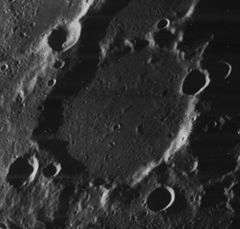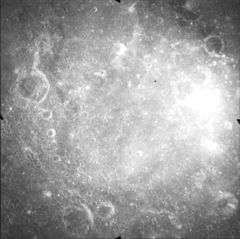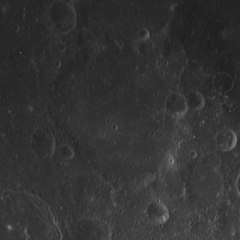Kästner (crater)
Kästner is a lunar impact crater that is located near the eastern limb of the Moon, to the southwest of the Mare Smythii. Just to the northwest of Kästner is the walled plain Gilbert. To the south is the prominent crater Ansgarius, and to the southwest lies La Pérouse.
 Oblique Lunar Orbiter 4 image | |
| Coordinates | 7.0°S 79.1°E |
|---|---|
| Diameter | 49 km |
| Depth | Unknown |
| Colongitude | 283° at sunrise |
| Eponym | Abraham G. Kästner |

.jpg)

This formation belongs to the category termed a walled plain. It has a worn, irregular outer wall that is overlaid by several small craters and there is a small break along the north-northeast. Along the northeastern rim is Kästner B, and to the southwest is the small Kästner E. A shallow, unnamed crater is attached to the southern rim. The interior floor is relatively level and featureless, with only a few small craterlets and minor ridges.
Satellite craters
By convention these features are identified on lunar maps by placing the letter on the side of the crater midpoint that is closest to Kästner.
| Kästner | Latitude | Longitude | Diameter |
|---|---|---|---|
| A | 4.5° S | 77.3° E | 25 km |
| B | 6.3° S | 80.7° E | 20 km |
| C | 8.0° S | 76.9° E | 19 km |
| E | 8.1° S | 77.6° E | 10 km |
| G | 4.2° S | 79.0° E | 72 km |
| R | 6.9° S | 82.3° E | 17 km |
| S | 8.0° S | 83.2° E | 30 km |
The following craters have been renamed by the IAU.
- Kästner F — See Black.
Kästner B, R, and S are called Defoe, Shekhov, and Cellini on some older maps,[1] but these names were not approved by the IAU.
References
- Andersson, L. E.; Whitaker, E. A. (1982). NASA Catalogue of Lunar Nomenclature. NASA RP-1097.CS1 maint: ref=harv (link)
- Blue, Jennifer (July 25, 2007). "Gazetteer of Planetary Nomenclature". USGS. Retrieved 2007-08-05.CS1 maint: ref=harv (link)
- Bussey, B.; Spudis, P. (2004). The Clementine Atlas of the Moon. New York: Cambridge University Press. ISBN 978-0-521-81528-4.CS1 maint: ref=harv (link)
- Cocks, Elijah E.; Cocks, Josiah C. (1995). Who's Who on the Moon: A Biographical Dictionary of Lunar Nomenclature. Tudor Publishers. ISBN 978-0-936389-27-1.CS1 maint: ref=harv (link)
- McDowell, Jonathan (July 15, 2007). "Lunar Nomenclature". Jonathan's Space Report. Retrieved 2007-10-24.CS1 maint: ref=harv (link)
- Menzel, D. H.; Minnaert, M.; Levin, B.; Dollfus, A.; Bell, B. (1971). "Report on Lunar Nomenclature by the Working Group of Commission 17 of the IAU". Space Science Reviews. 12 (2): 136–186. Bibcode:1971SSRv...12..136M. doi:10.1007/BF00171763.CS1 maint: ref=harv (link)
- Moore, Patrick (2001). On the Moon. Sterling Publishing Co. ISBN 978-0-304-35469-6.CS1 maint: ref=harv (link)
- Price, Fred W. (1988). The Moon Observer's Handbook. Cambridge University Press. ISBN 978-0-521-33500-3.CS1 maint: ref=harv (link)
- Rükl, Antonín (1990). Atlas of the Moon. Kalmbach Books. ISBN 978-0-913135-17-4.CS1 maint: ref=harv (link)
- Webb, Rev. T. W. (1962). Celestial Objects for Common Telescopes (6th revised ed.). Dover. ISBN 978-0-486-20917-3.CS1 maint: ref=harv (link)
- Whitaker, Ewen A. (1999). Mapping and Naming the Moon. Cambridge University Press. ISBN 978-0-521-62248-6.CS1 maint: ref=harv (link)
- Wlasuk, Peter T. (2000). Observing the Moon. Springer. ISBN 978-1-85233-193-1.CS1 maint: ref=harv (link)